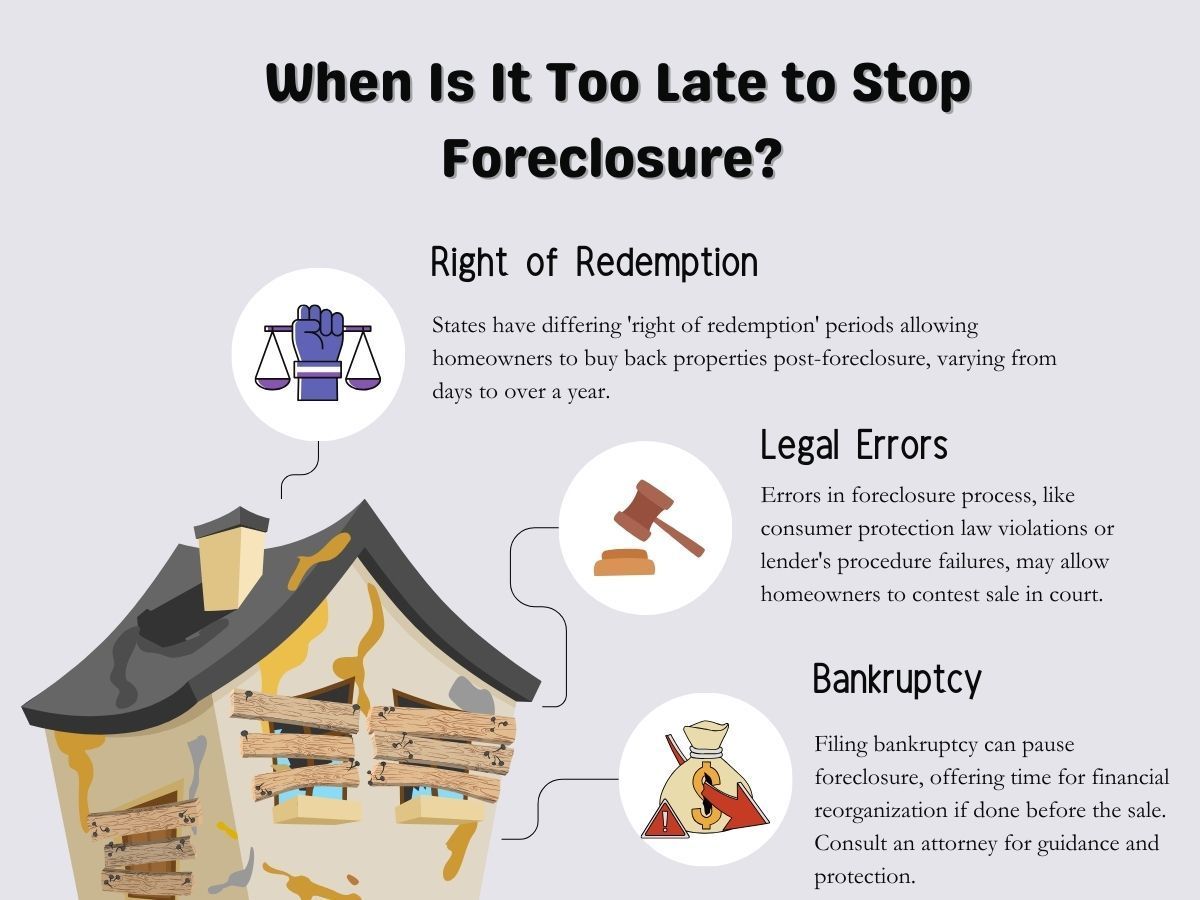When Is It Too Late To Stop Foreclosure
September 2, 2023
Foreclosure is a process that no homeowner wants to face. It occurs when a homeowner falls behind on their mortgage payments, and the lender takes legal action to repossess the property.
The prospect of losing one's home can be overwhelming, but it's important to know that there are
options available to stop or delay foreclosure, even at the last minute. Understanding the foreclosure process, knowing your rights, and taking proactive steps can significantly affect the outcome.
In this article, we will explore the foreclosure timeline, the options available to homeowners, and the importance of seeking legal advice early in the process.
Understanding the Foreclosure Process
The foreclosure process begins when a homeowner misses a mortgage payment. After a certain number of missed payments, typically 90 to 120 days, the lender will send a notice of default to the homeowner. This notice informs the homeowner that they are in default on their mortgage and that foreclosure proceedings will begin if the default is not cured.
If the homeowner does not cure the default, the lender will file a lawsuit to initiate foreclosure.
The homeowner will receive a summons and complaint outlining the lender's case against them. The homeowner has a set amount of time to respond to the complaint, usually 20 to 30 days. If the homeowner does not respond, the lender can obtain a default judgment and proceed with the foreclosure sale.
The foreclosure sale is typically an auction where the property is sold to the highest bidder.
The proceeds from the sale are used to pay off the outstanding mortgage debt, and any remaining funds are returned to the homeowner. However, if the sale proceeds are not enough to cover the debt, the homeowner may still be liable for the deficiency.
Pre-Foreclosure Options
Before the foreclosure process officially begins, homeowners have several options to stop foreclosure. These options include:
- Loan Modification: The lender may agree to modify the terms of the loan, such as reducing the interest rate or extending the repayment period. This can make the mortgage payments more affordable for the homeowner.
- Forbearance: The lender may temporarily suspend or reduce mortgage payments, giving the homeowner time to catch up. This is typically a short-term solution for temporary financial hardships.
- Short Sale: With the lender's approval, the homeowner may sell the property for less than the outstanding mortgage balance. This can help the homeowner avoid foreclosure and the negative impact on their credit.
Deed in Lieu of Foreclosure: The homeowner may voluntarily transfer the property to the lender in exchange for the cancellation of the remaining mortgage debt. This is often a last resort option for homeowners who cannot sell their property or qualify for a loan modification.
Stopping Foreclosure During the Legal Process
Once the foreclosure process has begun, homeowners still have options to stop foreclosure:
- Filing an Answer: The homeowner can respond to the foreclosure complaint, raising defenses or counterclaims that may delay or stop the foreclosure process. Common defenses include errors in the foreclosure paperwork, violations of consumer protection laws, and the lender's failure to follow proper foreclosure procedures.
- Mediation: Some states offer foreclosure mediation programs, where the homeowner and lender can negotiate a resolution with the help of a neutral mediator. This can result in a loan modification, repayment plan, or other alternatives to foreclosure.
Bankruptcy: Filing for bankruptcy can temporarily halt the foreclosure process, giving homeowners time to reorganize their finances. Chapter 13 bankruptcy allows the homeowner to create a repayment plan to catch up on their mortgage payments, while Chapter 7 bankruptcy may discharge unsecured debts and free up funds to pay the mortgage.
When Is It Too Late to Stop Foreclosure?
It is generally too late to stop foreclosure once the foreclosure sale has occurred. The property has been sold to the highest bidder, usually the lender or a third party, and the homeowner no longer has any legal rights to the property.
However, there are some exceptions:

Right of Redemption
Some states have a "right of redemption" period, during which the homeowner can repurchase the property by paying the full sale price plus any additional costs. This period varies by state, ranging from a few days to a year or more.
Legal Errors
If there were errors in the foreclosure process, such as violations of consumer protection laws or the lender's failure to follow proper foreclosure procedures, the homeowner may be able to challenge the foreclosure sale in court.
Bankruptcy
Filing for bankruptcy can temporarily halt the foreclosure process, giving homeowners time to reorganize their finances. However, this option must be exercised before the foreclosure sale.
It is essential for homeowners facing foreclosure to seek legal advice as soon as possible. An attorney can help you understand your rights and options and represent you in negotiations with the lender or court. The sooner you take action, the more options you will have to stop foreclosure and protect your home.
Seeking Legal Advice
If you are facing foreclosure, seeking legal advice as soon as possible is essential. An attorney can help you understand your rights and options and represent you in negotiations with the lender or court. The sooner you take action, the more options you will have to stop foreclosure and protect your home.
In a nutshell, it is never too early to take action to stop foreclosure. The sooner you address the issue, the more options you will have to save your home. Whether you are considering a loan modification, short sale, or bankruptcy, seeking legal advice and taking proactive steps to protect your rights and property is important.
Key Takeaways
Foreclosure can be a challenging and stressful experience, but homeowners have options to halt or delay the process. It's crucial to seek legal advice early on to navigate the complexities of foreclosure law and negotiate with lenders.
Being proactive, informed, and willing to work with your lender and legal counsel can increase your chances of keeping your home or minimizing the financial impact of foreclosure.
Remember, you're not alone; resources are available to help you through this difficult time.











